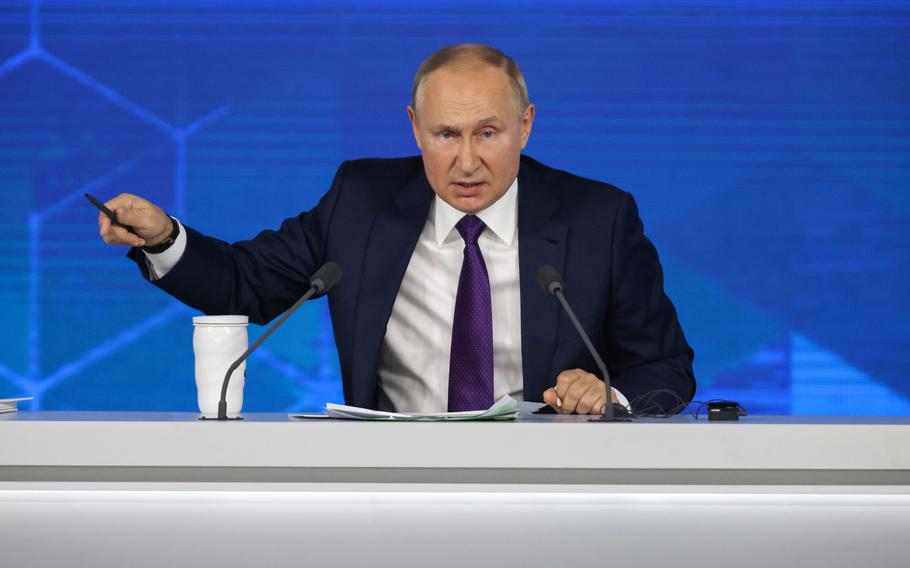
Russian President Vladimir Putin delivers his annual news conference in Moscow in December. (Andrey Rudakov/Bloomberg)
(Tribune News Service) — Russia's latest wave of threats to use nuclear weapons and cut energy supplies even further so far haven't scared off Ukraine's allies in the U.S. and Europe, only hardening their will to see Kyiv win.
What they're not so sure about is whether they want Vladimir Putin to lose.
Joe Biden brought the tension into the open Thursday, warning that the Russian president's nuclear threats may not be a bluff as his other options for salvaging his invasion of Ukraine narrow.
"We're trying to figure out what is Putin's off-ramp? Where does he get off? Where does he find a way out?" the U.S. president said Thursday at a fundraiser in New York City. "Where does he find himself in a position that he does not, not only lose face but lose significant power in Russia?"
For the moment, Putin has backed himself further into a corner, effectively ruling out talks with his annexation of occupied Ukrainian lands and redoubling his commitment to fight with the order to call up at least 300,000 reservists despite rising consternation at home.
"Putin is effectively putting new conditions on the table," said Alexei Makarkin, deputy head of the Center for Political Technologies in Moscow. "There's virtually no room for maneuver."
One European official likened Putin's situation to a cornered animal that's only getting more dangerous as he drives himself further into the trap.
At the same time, Ukraine's counteroffensive has retaken thousands of square kilometers of territory once held by Russia in just a few weeks, fueling Kyiv's ambitions to push Moscow's forces back further, possibly even beyond the lines they held before the Feb. 24 invasion. The more progress they make, the greater the pressure for the kind of defeat that would be far more than Putin could accept.
U.S. and European officials say they see little prospect that Russia's newly mobilized forces, with little motivation or training and limited equipment, will allow Putin to stop the Ukrainian advance.
But they don't see a quick victory either and have resisted Kyiv's demands for longer-range weapons to speed that outcome.
With only a few more weeks before winter's cold begins to complicate fighting, U.S. and European officials worry the war may drag out, with Russia unable to regain the initiative but willing to expend vast numbers of troops and equipment to slow Ukraine's advance. Some suggest Kyiv may be able to push Moscow's forces back by next summer.
Ukrainian officials say the success of their counteroffensive so far shows that they can evict Russian troops from most of the rest of the territory occupied since the Feb. 24 invasion within 3-6 months if weapons supplies from the U.S. and its North Atlantic Treaty Organization allies continue. Battlefield successes to date have boosted calls to retake all the territory lost to Russia, including Crimea, which Putin annexed in 2014.
In Moscow, some officials hope European and U.S. resolve will weaken under the pressure of energy cutoffs and the growing cost of supporting Ukraine. But behind the public displays of confidence that the mobilization will allow Russian troops to resume the offensive within a month or two, some insiders concede that the most the Kremlin can now aim for is a drawn-out conflict that lasts years with periodic flare-ups.
That prospect has fueled the fears on both sides that Putin may decide that he has no alternative but to escalate further, with even-larger strikes on Ukrainian power plants and other civilian installations or use of chemical or nuclear weapons. The sabotage of the Nord Stream gas pipelines under the Baltic Sea has triggered worries that Europe's energy infrastructure could be targeted as well.
Putin can be "quite dangerous and reckless" when he "feels his back against the wall," William Burns, director of the U.S. Central Intelligence Agency, told CBS in an interview this week. The Russian leader is working based on "flawed assumptions, where he thinks he can tough it out with the Ukrainians, and with the United States, and with the West."
Former U.S. National Security Adviser John Bolton publicly called for "regime change" this week, saying Putin had to go. But some European officials worry his replacement would be even more hard-line.
Adding to the uncertainty is the fact that while Putin has been rhetorically very tough about his "red lines," he hasn't always backed that up with action. Some territory that Putin declared to be Russian "forever" following the annexations has already been retaken by the Ukrainian military, prompting fierce criticism in state media about the performance of the Kremlin's forces.
Despite warning that attacks on Crimea would trigger a massive retaliation, Putin didn't escalate dramatically after Kyiv hit military facilities on the peninsula with a series of strikes over the summer. And Russia has so far gone out of its way to play down attacks on border areas near Ukraine, at times calling explosions "loud noises" in public to avoid having to admit fighting on its own territory.
A broader defeat in Ukraine would be too much for Putin to cover up. "Russians wouldn't understand this," said Makarkin, the political consultant.
©2022 Bloomberg L.P.
Visit bloomberg.com.
Distributed by Tribune Content Agency, LLC.